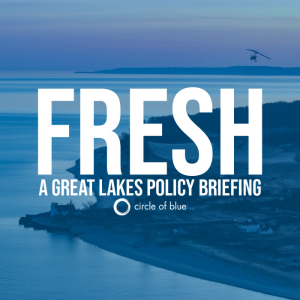Federal Water Tap, May 31: EPA Proposes Protection for Salmon-Rich Bristol Bay
The Rundown
- The EPA intends to deny a Clean Water Act permit for a mine development in Alaska’s Bristol Bay watershed.
- NOAA expects another above-average Atlantic hurricane season.
- Officials sign a Navajo-Utah water rights settlement.
- The EPA announces an interagency working group for water reuse.
- The CDC surveys O’ahu residents for health problems after a jet fuel spill that contaminated drinking water.
- The USGS assesses groundwater levels in a New Mexico basin that has been the target of water exporters.
And lastly, the U.S. State Department offers a $1.1 million grant for research into environmental damage in Latin America and the Caribbean from organized crime.
“Two decades of scientific study show us that mining the Pebble Deposit would cause permanent damage to an ecosystem that supports a renewable economic powerhouse and has sustained fishing cultures since time immemorial. Clearly, Bristol Bay and the thousands of people who rely on it deserve the highest level of protection.” — Casey Sixkiller, EPA Region 10 administrator, explaining why the agency is proposing to deny a Clean Water Act permit for the Pebble mine, located in the headwaters of Alaska’s Bristol Bay.
By the Numbers
3 to 6: Number of major hurricanes that NOAA is forecasting for the Atlantic and Gulf coasts this season. A major hurricane is rated category 3 or higher on the Saffir-Simpson scale, a rating system based on wind speed. The commonly used scale does not take rainfall into account. NOAA says that La Niña conditions are one factor helping to fuel what is expected to be another above-average hurricane season. Between 14 and 21 named storms could form through November.
News Briefs
EPA Proposes Protection for Salmon-Rich Bristol Bay
The U.S. Environmental Protection Agency intends to prohibit a mine development in the upper watershed of one of the world’s richest sockeye salmon fisheries, potentially culminating a years-long struggle over the future of the Pebble mine.
The protections for Alaska’s Bristol Bay watershed come in the form of a denial: the EPA is recommending against a permit for disposing dredged material and mine waste in the watershed around the ore deposit.
The Pebble mine is laced with ores bearing copper, gold, and molybdenum.
The United Tribes of Bristol Bay, a group that represents area tribes, said that the announcement was “an exciting and overdue step toward permanent protections.”
The Pebble Partnership, the mine developer, had a different view, saying the proposal is a “giant step backward” for clean energy goals. It argues that the mine is a domestic source of minerals needed for batteries and other non-fossil fuel energy.
Public comments are being accepted through July 5. Submit them via www.regulations.gov or email to ow-docket@epa.gov using the subject line EPA-R10-OW-2022-0418.
Three public hearings will be held in June.
Navajo Water Rights Agreement Signed
Tribal, state, and federal officials attended a ceremony to sign the Navajo-Utah water rights settlement.
The agreement grants the Navajo Nation 81,500 acre-feet of water from the San Juan River, a tributary to the Colorado River. Along with water rights, the agreement provides about $210 million in federal funding for water infrastructure development on the Utah portion of the Navajo Nation.
Studies and Reports
Groundwater in New Mexico
The U.S. Geological Survey published a groundwater assessment for a remote and lightly populated basin in west-central New Mexico that has been the target of water-export speculators.
The assessment found that groundwater levels in the semiarid San Agustin basin have been stable since the 1970s
In context: War over Old Water
Environmental Justice Evaluation
The White House Council on Environmental Quality responded to an advisory panel’s recommendations for incorporating environmental justice into government practice.
The 201-page CEQ report addresses, point by point, recommendations from the White House Environmental Justice Advisory Council.
Health Problems from Fuel Spill on O’ahu
The Centers for Disease Control and Prevention surveyed residents affected by a jet fuel spill on O’ahu. The spill occurred in November 2021 and affected drinking water on Joint Base Pearl Harbor-Hickam.
Eighty-seven percent of respondents reported experiencing a health symptom after the spill. Most common were afflictions of the nervous system, gastrointestinal system, and skin. Most symptoms cleared after a respondent stopped using the contaminated water.
Fourteen percent of the estimated 9,694 affected households participated in the survey.
On the Radar
Environmental Impact of Organized Crime in Latin America and Caribbean
The U.S. State Department is offering a $1.1 million grant for research into the environmental impacts in Latin America and the Caribbean of organized crime and other illegal activities.
Such activities could include water pollution from illegal gold mining, deforestation, and drug cultivation.
The project is expected to last 18 to 42 months.
The State Department will answer questions about the grant opportunity at an online roundtable on June 20 at 11:00 a.m. Eastern. Applications are due July 25.
Water Reuse Working Group
Fifteen federal agencies will collaborate to expand the use of recycled water.
The EPA will submit a report to Congress every two years on the working group’s activities.
Federal Water Tap is a weekly digest spotting trends in U.S. government water policy. To get more water news, follow Circle of Blue on Twitter and sign up for our newsletter.
Brett writes about agriculture, energy, infrastructure, and the politics and economics of water in the United States. He also writes the Federal Water Tap, Circle of Blue’s weekly digest of U.S. government water news. He is the winner of two Society of Environmental Journalists reporting awards, one of the top honors in American environmental journalism: first place for explanatory reporting for a series on septic system pollution in the United States(2016) and third place for beat reporting in a small market (2014). He received the Sierra Club’s Distinguished Service Award in 2018. Brett lives in Seattle, where he hikes the mountains and bakes pies. Contact Brett Walton







Leave a Reply
Want to join the discussion?Feel free to contribute!